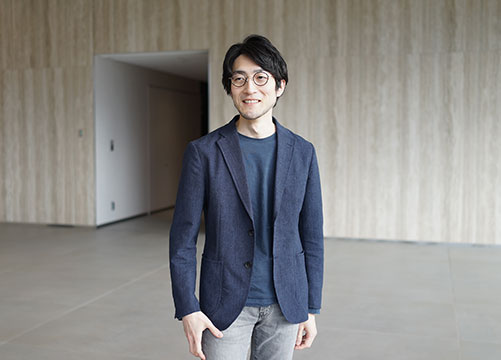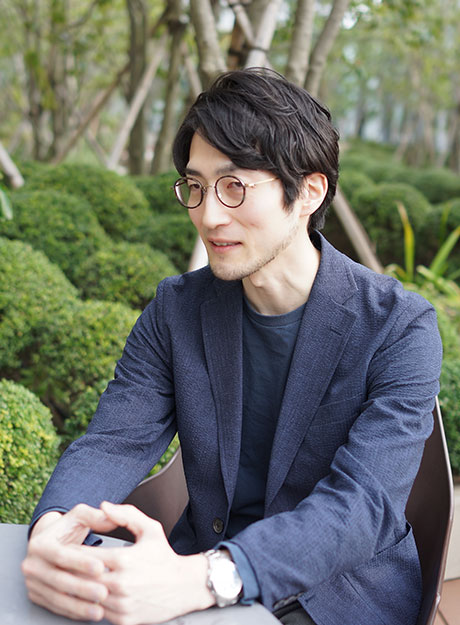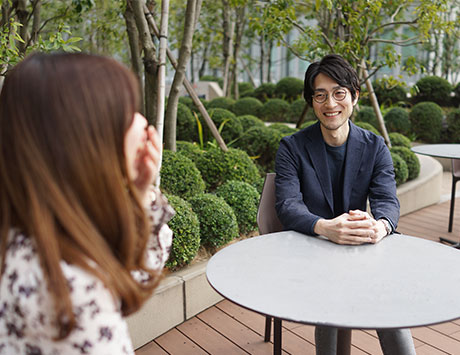Dr. Tokyo University from Theoretical Physics to AI Service Developer Interview with CTO Takahiro Mikami.
"AI is behind the scenes.
We want to be a service provider that
reaches end users."
CTO
Takahiro Mikami
(*) Note: Evaluated as "extremely outstanding achievement" with an average elementary score of 90 or higher over four years of undergraduate study.
Reference:Grading at the University of Tokyo

Mikami:D. in theoretical physics in the field of condensed matter theory. In this field, I attempted to elucidate the properties of familiar materials using quantum theory, the laws of physics that govern the microscopic world as small as an atom. I had always loved mathematics and had a strong desire to pursue its theoretical beauty, but I also wanted to produce results that would be useful in the real world.
I chose the research field for my doctoral degree through such thinking, and I think I developed a business perspective through my research. I also acquired knowledge about system construction and algorithms by creating large-scale simulations on my own.
While writing my doctoral dissertation, I had a strong desire to contribute to something useful in the real world, and eventually decided to leave academia with the desire to contribute directly to the world. In order to learn about the real world, I decided to once out in the real world and joined Nomura Research Institute because I could make use of my practical experience in system development and research.
After joining Nomura Research Institute, Mikami worked for the company until 2020.
He says that theoretical physics and deep learning have a lot in common in terms of basic prerequisite knowledge, and he was able to catch up quickly.
Mikami:I worked at Nomura Research Institute for five years. I belonged to the research and development department, where I conducted technical research and front-loading to modernize system development, and provided support for the actual introduction of systems to clients. It was a very fruitful five years, as I experienced a variety of projects and grew both technically and as a businessman. I was also involved in the research and development of advanced quantum computers.
While I gained a good understanding of system development and the skills to put them into practice, I also felt a strong desire to use my skills to create my own services that would not only support clients but, to put it bluntly, have a big impact on people's lives, but at the same time I felt that it was difficult to take action because I was working for a large company. On the other hand, I sometimes felt that it was difficult to take action because I was in a large company.
I enjoyed implementing image recognition models such as ResNet and natural language models such as LSTM that were popular at the time, and eventually won an in-house competition. I was fascinated by this new technology and eventually won an in-house competition. Coming from a theoretical physics background, I think it was significant that I had a good affinity with mathematical backgrounds, such as building large-scale systems, performing linear algebra and matrix operations, tensor operations, and error back propagation, and the mathematical part was in my skin, or rather, I could absorb it immediately.
At that time, I strongly realized that deep learning, a technology that was still new to me, could have an innovative and significant impact on users.
The experience of being posted to San Francisco and developing services in Silicon Valley was a major turning point for Mikami.
Mikami:I was given the opportunity to be posted overseas to the United States through an in-house program.
The project involved researching local needs, developing new products from scratch, and launching an in-house start-up company.
San Francisco is not a very safe city, and there are many cases of shoplifting, so from a Japanese point of view, I felt that I did not feel safe there. At that time, we wondered what we could do to create a safe environment in cafes and other facilities, and came up with the idea that we could form a good community through a platform where people look after each other's belongings. In fact, we developed a new service through a process of interviewing local people in San Francisco, creating a prototype based on the interview, getting feedback from users, and brushing up the prototype.
This kind of experience gave me a good opportunity to think deeply about how to create value from the end user's perspective, not from the developer's perspective. This experience has directly helped me in my current development at NEURAL.
Later, when I was working in the R&D department, I was approached by Sasaki, the former CTO of NEURAL. Sasaki is actually a classmate of mine in physics at the University of Tokyo, and our backgrounds as engineers overlap in many ways. At NEURAL, systems are developed and implemented using new technologies, and I found it very attractive to create new services by myself, rather than simply supporting customers. I felt that I could make use of my business sense, and decided to join NEURAL.


Afterwards, Mikami will join the NEURAL, an AI venture.
Are there any operations that impressed you at NEURAL or that you find useful when developing services?
Mikami:I am most impressed with the development of the "Remodesk" solution. It was a very meaningful project that allowed me to practice "running AI on the edge," as I had just joined the company. I felt a great sense of fulfillment from the experience of being able to develop it as a service with an overwhelming sense of speed from start to finish, while keeping it solidly built as a system under various technical constraints.
The Remodesk service requires an AI model to run in the user's web browser to extract facial features and detect objects such as smartphones at a certain inference speed. In order to meet such functional requirements on a PC terminal with limited CPU capacity, we had to optimize the model for the Web browser, reduce the memory deployment size of the model itself, and separate worker threads to improve the user experience. In addition to the accuracy of the model, various other considerations had to be taken into account, such as reducing the memory deployment size of the model itself and separating worker threads to improve the user experience. We also had difficulty in providing services to satisfy the requirement of high-speed inference processing here, as the performance of end-users' devices and browsers differed from each other.
I was very happy that we were able to build a service using AI and contribute to it by addressing these practical issues head-on. It took about six months from development to release. At NEURAL, we often take the approach of first building a prototype, and then using that as a starting point, we build the service so that it can be used in a production environment. We are always trying to be creative in terms of building the system ahead of time so that we can incorporate new requirements as soon as they come in.
At NEURAL, it is not uncommon for one engineer to be involved in multiple projects in parallel. I think NEURAL's style is to create a large impact by building services with a sense of speed and efficiency.

Mikami has developed various AI services since his participation in NEURAL. He says that good teamwork is also important in developing such systems. What are the strengths and attractions of NEURAL's technology development organization?
Mikami:We believe that the fundamental strength of NEURAL's engineers is that they all have some
kind of spike in their skills and have a mutual respect for each other with that as the core of their relationship.
We do not evaluate hard skills alone as a hiring criterion, but rather we hire hard
by emphasizing soft skills as well, such as coding tests to test logical thinking skills,
and whiteboard tests to test whether the candidate can discuss problem solving,
as well as communication skills during interviews.
Our goal is to attract members who have the ability to grow as engineers while cooperating with
others after joining the company. We do not make decisions based solely on current skills,
but rather on the strengths of each individual and their ability to learn from each other.
We are looking for individuals who have their own strengths, who respect each other,
and who can work well together as a team.
I feel that such an aim has been successful, and that we have attracted high quality engineers,
who are highly competent and have a good cultural fit.
Our thinking in this area has been previously presented and published in an AWS webinar.
Movie:Mindset and skill set to support NEURAL growth
I always feel that the current engineers at NEURAL are a select few,
but they are a great team with excellent teamwork,
and I myself feel happy to be able to enjoy development as an engineer myself.
I think the most attractive thing about NEURAL is that it is an organization where
I can focus on creating good products with dependable members and having fun.
Finally, as CTO of NEURAL, what kind of future do you hope to achieve?
Mikami:The rate of technological progress with regard to AI is tremendous and the spread is wide-ranging. Some of these technologies range from transient fads to those that will qualitatively transform society. In any case, no matter what technology is used, it is meaningless if it does not reach the hearts of end users. I believe that simply creating something because a client requested it, trying something because it is popular, or developing something that does not fit with the company's vision and mission is not like NEURAL. I am not particular about the process, but I place importance on whether the AI service I develop can be used with peace of mind and whether it can contribute to people living in the community in an actual smart city.
As CTO, I would like to calmly assess the usefulness and future potential of the technology, and always keep in mind whether or not it can be delivered to end users as a high value-added service that is unique to our company. I believe that it is important to keep up with technology, have my own scale and the core ideas of the organization, and make calm judgments about them. I would like to create as many innovative and exciting AI services as possible.
I believe that the definition of success is to create good services and be useful to end users.
The people we want now are leaders who can unite dozens or hundreds of people in the future. For this reason, we hire people with strong spikes who specialize in one technology. If you specialize in one technology, you will be respected by the team and naturally gain popularity. In fact, an overseas engineer who joined us in the past said, "I don't want to manage," but he has grown up to be a leader before he knew it and is expanding his activities.
The members of NEURAL are people with a voracious appetite for technology. Data science experts, AI researchers, and world-class white hat hackers who have delved into their own domain knowledge are learning from each other. I am the CTO and it is very exciting and I learn more every day. If you enjoy this environment together and want to compete globally, please join NEURAL.







